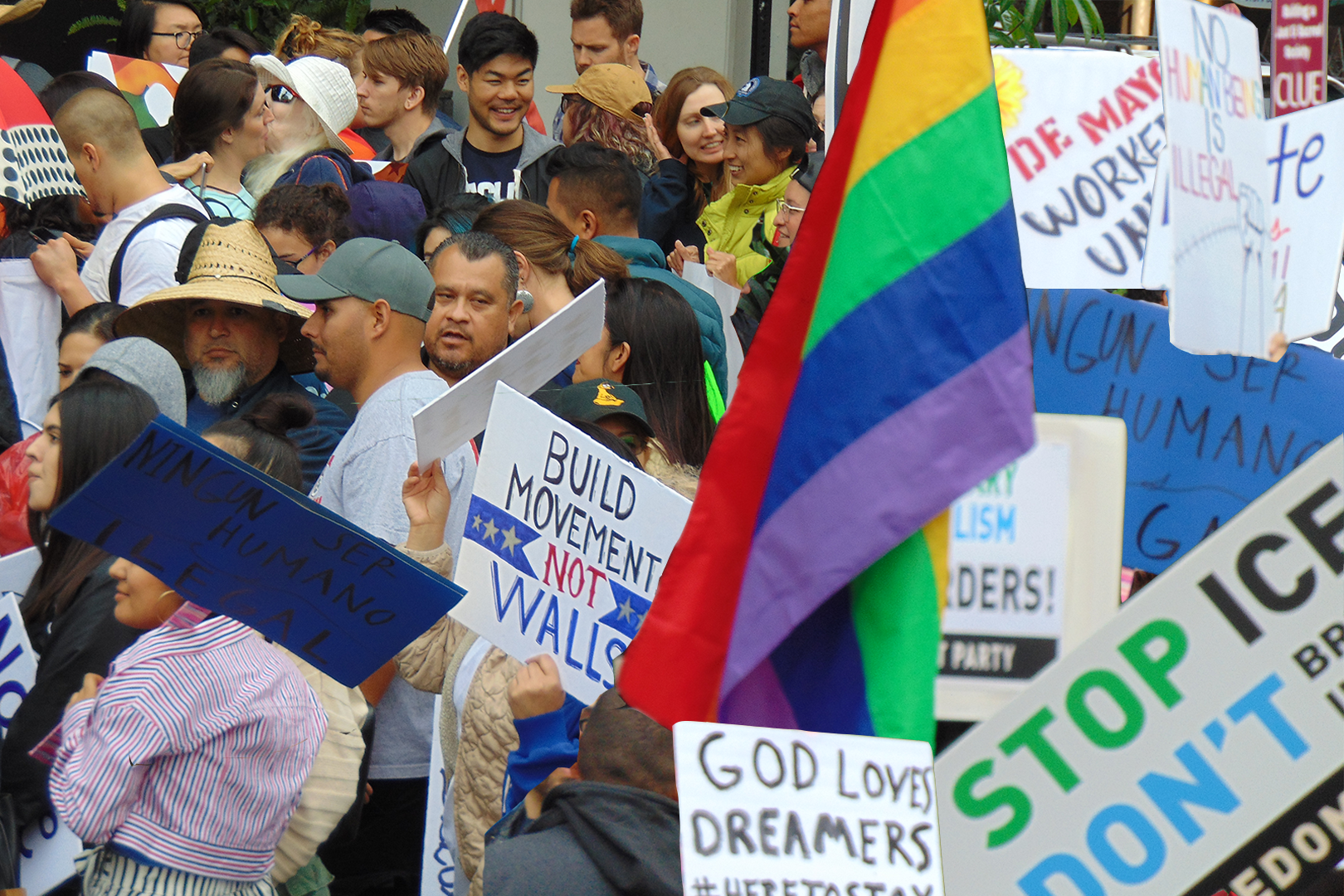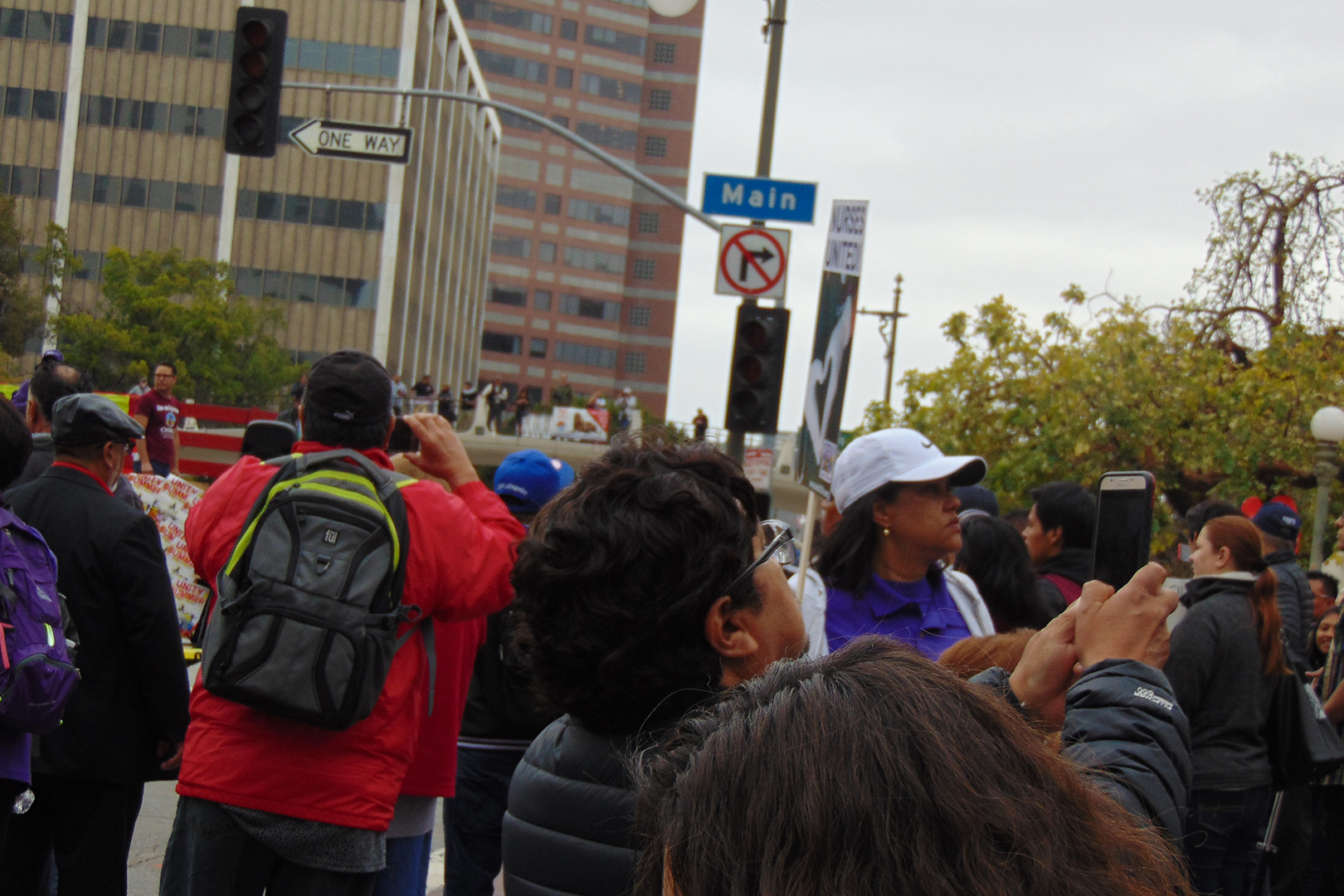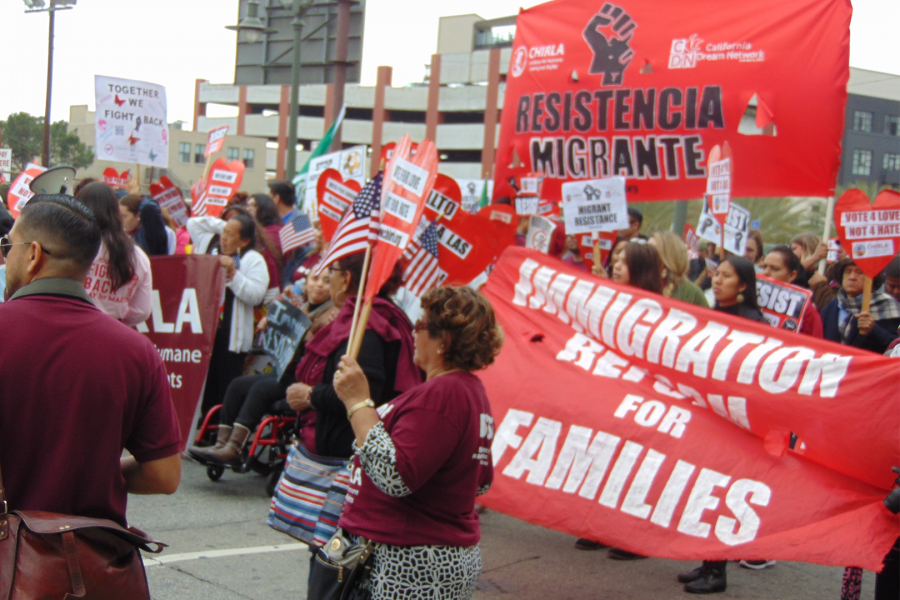Mayday is not just a distress call.
International Workers’ Day is celebrated every May 1, as “May Day.” In celebration, worker activists hosted a three hour event, and marched 1.3 miles through a rainy Los Angeles to demand labor issues be addressed.
The 1.3 mile march was held on Tuesday, May 1, from noon to 3 p.m. The march began at Pershing Square located on Sixth Street and Olive Street, and ended on Temple Street and Judge John Aiso Street.
From the very start at Sixth and Olive, helicopters were whirring overhead with chants, songs, and voices being raised over PA systems.
The Teamsters, the strongest and most diverse labor union according to their website, were the first to make their presence known.
They shouted the “Everywhere we go” chant with Teamsters as the “mighty mighty Teamsters.”
One group sang “Solidarity Forever” among the crowd during the chant.
After the song ended, the Teamsters continued to shout “who are we?” “Teamsters!” before singing the chant again.
When there was a slight break in between the songs and chants, a man handing out “Refuse Fascism 2018 Call to Action” leaflets stated, “To drive out Trump/Pence we need a mass movement. We can’t rely on the democrats.”

Even when the musicians took the stage, the different groups chanted, this time in Spanish, when speakers took to that same main “stage” of an opened vehicle bed.
The live music from the band lasted for more than 30 minutes. Their upbeat Latin music had strong Santana vibes, and entertained the crowd members that were not chanting. Signs bobbed up and down to simulate dancing.
The speakers, despite being drowned out by the crowd, managed to have their words heard.
“May Day has always been about bringing our community together,” one female speaker said.
Another speaker arranged a Spanish call and response, which set the standard for crowd engagement to come.
Soon every chant became call and response.
“What do we want?”
“Justice!”
“When do we want it?”
“Now!”
“Fight!”
“Back!”
After an hour and 20 minutes of standing and chanting, the march began.
The labor activists marched all the way from Sixth Street and Olive Street to Temple Street and Main Street.
The first rally began on Temple Street and Main Street, which served as the midpoint of the march.

Speakers at the rally encouraged participants to “tell the government” their position by having them scream chants as loud as they could. The participants chanted: “Let them in” “let them stay” and “this is their home” followed by “together we fight” and “together we win.”
Rusty Hicks, President of the Los Angeles County Federation of Labor, spoke next and used a hand analogy.
“When we are together, we are like the fist,” he said as several fists from the crowd raised into the air.
The final leg of the march took place on Judge John Aiso Street and Temple Street with 10 speakers. The first speaker riled up the crowd with his chant.
“They got money, they got lies”
“We fight back, we organize”
The speech concluded with the message: “We are one.”
After more speeches, including one from Democrat Senator Kevin De Leon, the march concluded.
Unlike Labor Day, celebrated the first Monday of September, May Day is not recognized as a holiday in the United States.
However, the two terms are synonymous everywhere else in the world.
Labor Day has been recognized in the states since 1887, and became a federal holiday in 1894.
Efforts to switch Labor Day to May Day for Americans have been largely unsuccessful. One reason may be the history behind May Day.
International Workers’ Day commemorates the Chicago based Haymarket affair of May 4, 1886.
A peaceful rally in Haymarket Square emerged to support workers striking for an eight hour work day, and in reaction to the police killing workers.
An unidentified individual threw a handmade bomb that resulted in gunfire and the loss of seven officers and four civilians with several more injured.
Following the attack, eight anarchists were convicted with conspiracy and four were hanged.
The effects are still felt to this day, with the incident being a core influence to the labor cause.
Yolanda Alaniz, 68, has worked with the labor movement for over 50 years. With a degree in journalism, she was a University of Washington daily reporter, and has published three books related to the issue.
She co-authored ¡Viva la Raza!: Chicano Identity and Resistance in 2006 and Viva La Raza: A History of Chicano Identity and Resistance in 2008 with Megan Cornish. She wrote her first book Voices of Color with Nellie Wong in 1999.
She is also a member of the Freedom Socialist Party, a group that split off from the main branch in 1966.
It is also one of the first parties to combine the ideas of the socialist and feminist groups. The party supports transgender rights and male feminists.
“Capitalism is the enemy,” Alaniz said. “Capitalism turns people sexist, racist, homophobic, and xenophobic… of course it helps if you have the administration behind it.”
Other organizations, like Nurses United and a group of teachers, all united under the labor movement to have their voices resonate.
The march ended in better weather than it had started in.



